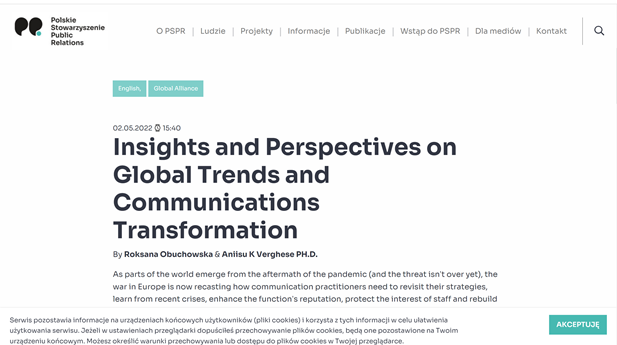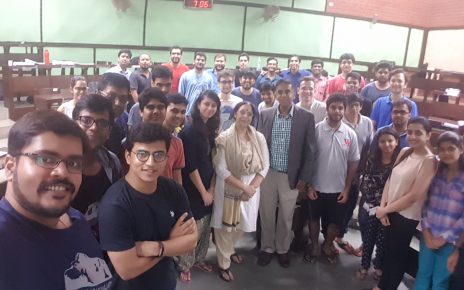There are numerous challenges and risks that the public relations function can address and convert into opportunities now and in the future. Roksana Obuchowska and I make an attempt at placing current issues in perspective, drawing from trends shaping our world. Interested in your thoughts.
This article first appeared on the Polish PR Association website https://polskipr.pl/publikacje/741364/insights-and-perspectives-on-global-trends-and-communications-transformation
By Roksana Obuchowska & Aniisu K Verghese PH.D.
As parts of the world emerge from the aftermath of the pandemic (and the threat isn’t over yet), the war in Europe is now recasting how communication practitioners need to revisit their strategies, learn from recent crises, enhance the function’s reputation, protect the interest of staff and rebuild their organization’s brand image.
In Poland, the media market and reportage are getting polarized with a diverse range of topics that are often conflicting. Market plurality, political independence and social inclusiveness are themes emerging as high risks as per the study by the Center for Media Pluralism and Media Freedom in 2021.
According to the 2021 European Communication Monitor digital transformation is taking shape. Across Europe, 39% of practitioners feel that there is more to be done to be digitally mature as communication units. Interestingly, in Europe, digital acceleration is a top concern for the C-suite, as per Mercer’s 2022 Global Talent Trends report. With the domains of employee communications and public relations blending seamlessly in a post-COVID world, there is a greater need to appreciate what makes staff thrive. In Mercer’s study, for Europe, fulfilling work, feeling valued for contributions and being able to integrate work and life, were the top three.
From the discussions, globally there are common themes that are impacting how public relations practitioners can engage in an evolving world of work and workplaces. Disinformation is today a significant concern further aggravated by the spread of newer technologies. Peter Mutie, Chairman of the Global Alliance Regional Council Africa raised this issue as one with a high impact on Africa, although the challenge is wide ranging and global. The proliferation of fake news, especially highlighted by the ongoing war in Ukraine, means that industry professionals can step up and build capabilities and capacity within their organizations to prevent reputational risks and damage.
Another key theme highlighted is catering to the growing needs of the younger population (Gen Z, Post-Millenials), while addressing social justice and transparency, significant for regions like Asia Pacific and Hong Kong.
Finally, sustainability is another growing area of interest. According to the “ESG Investing: Practices, Progress and Challenges” report published by OECD, the broader range of ESG practices is worth over USD 17 trillion with 77% of organizations investing in these efforts due to financial, social or moral considerations.
Based on the above context, here are our perspectives on how these trends will shape the future of the profession and the professionals – in Poland and beyond.
Tackling disinformation and fake news collectively
We continue to live in a complex and difficult geopolitical and economic scenario in Poland with the COVID-19 pandemic heavily impacting society. Trust in media, public institutions, government and its decisions have eroded due to a lack of reliable sources of information, proliferation of cyber-attacks and pessimism among the public. Public relation professionals have a responsibility to take leadership, overcome “black PR”, and provide resources and ideas to overcome such threats.
It helps to be aware of the Code of Practice against Disinformation which helps to align forces and use the right tools to monitor and prevent the spread. Other approaches include: identifying various disinformation perpetrators, empowering independent media and civil society initiatives; having consistent information to review, creating an action plan to tackle misinformers and running awareness campaigns, to make it harder for people to even unintentionally support such acts.
Polish Public Relations Association (PSPR) in cooperation with Stowarzyszenie Agencji Public Relations (SAPR), have created the one pager of how to avoid disinformation. PSPR also supported the “WakeuPRussia” campaign launched by Olga Kisiel-Konopka, member of the Polish Public Relations Association.
Sustainable development (ESG)
There is a common misunderstanding of what sustainability is really about. Being focused on the aspects of eco-friendliness of the products we use or habits we develop, it is easy to miss the whole picture. Sustainable development defines all aspects of our lives, and marks its presence everywhere – from the supply chain management, through gender equality and well-being (also D&I), to peace and justice.
As PR professionals we can contribute to those efforts as well; There is a need of taking care of the wise and continuous development of the whole industry, working on the best practices and communication standards. There is a place to introduce common industry competence standards; to develop our competences by using PRtechs or adapting martech solutions. We can start with getting more training in other fields (i.e.,ESG itself, compliance, digital, HR, risk management, crisis management, and more).
COVID-19 pandemic and its consequences
With no doubts COVID-19 pandemic is still affecti ng business in Poland on various levels, from high, long-term inflation, which is changing social and consumer attitudes, through instability of supply chains and production continuity, lack of an adequate number of employees and predictability in terms of human resources; enormous, express growth of the e-commerce market, also in the FMCG industry, new unclear tax system – there are a lot of social and economic changes we are facing, but we believe that with the proper communication models we are able to make them at least less challenging for the all of us.
With the total lockdown in China, Europe seems to be pandemic free. In Polish media topic is rarely mentioned, and the attention of all the countries in the region is grabbed by the socio-economic issues and the difficult geo-political situation.
However, there is a space to initiate campaigns dedicated to specific industries, but also for the government to work on the stabilization of prices and the money value; introducing the possibility of mandatory vaccination of employees and verification of their COVID-19 certificates. We are sure that the pandemic isn’t over yet and we still need to be prepared for what it might bring.
Hybrid and new working models, market globalization
Not only corporations and white-collar workers are affected by the new, hopefully hybrid working models. COVID-19 hits the ‘business’ continuity of courts, local administration offices, transportation (also public) and many more. New working models need to be developed and implemented on very different levels; Market globalization, highly supported by the home and hybrid working is challenging the labor market – employees in Poland are being hired by international companies, and their salaries in other currencies make Polish employers less competitive. Not to mention international (mostly EU) competitors in the e-commerce world. The high quality of employer branding activities and employee advocacy can help companies based in Poland fight over their employees, inviting others to work and live in our country.
Personal branding of PR itself
As the role of personal branding and personalized brands itself is increasing, we see the need of taking care of our brand. There is a need to work on PR campaigns for the PR industry itself – we should all become the advocates of the common cause, to make sure that the positive role of communication is widely known and understood, and ethical behavior is not a slogan. Focusing on building a strong and reliable personal brand is a direction that will encourage positive changes.
Overall, these trends are indicative of the evolving responsibilities of the public relations practitioner and how the domain is subjected to numerous pressures and present opportunities to reform, engage and direct change in ways that transform the future of the world.
This article is an attempt to distill the themes emerging from the discussion during the Global Trends and Communications Transformation Month organized by the Global Alliance for Public Relations and Communications Management, in the perspective of Poland’s communication and public relations industry and practitioners.


